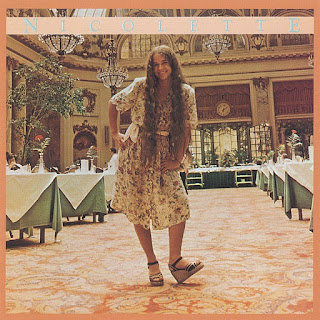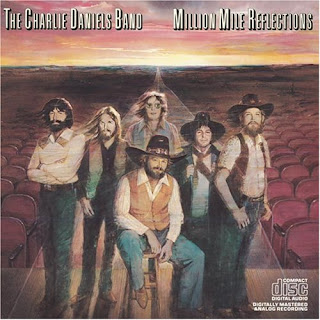Crazy Elephant was a short-lived American bubblegum pop band noted for their 1969 hit single, "Gimme Gimme Good Lovin'". Crazy Elephant was a studio concoction, created by Jerry Kasenetz and Jeff Katz of Super K Productions, promoted in Cash Box magazine as allegedly being a group of Welsh coal miners. Former Cadillacs member Robert Spencer was widely utilized on lead vocals, though future 10cc member Kevin Godley took lead vocals on "There Ain't No Umbopo", recorded at Strawberry Studios in Stockport, England, and released on the Bell label in May 1970. A touring group was formed later for promotional purposes. The bassist on "Gimme Gimme Good Lovin'" was Gary Gaynor, a local studio musician who also worked with Laura Nyro. The song was covered by Detroit band Adrenalin featuring vocalist David Larson in 1979 and later by Helix.
May 24, 2016
Crazy Elephant - Gimme Gimme Good Lovin' on Sugar Sugar The Birth Of Bubblegum Pop album (1969)
Ronnie Milsap - It Was Almost Like A Song (1977)
"It Was Almost Like a Song" is a song written by Hal David and Archie Jordan, and recorded by American country music singer Ronnie Milsap. It was released in May 1977 as the first single and title track from the album It Was Almost Like a Song. It became one of the greatest hits of his recording career upon its release in 1977.
repeat
repeat_one
shuffle
skip_previous
play_circle_filled
pause_circle_filled
skip_next
volume_up
repeat_one
shuffle
skip_previous
play_circle_filled
pause_circle_filled
skip_next
volume_up
In July 1977, "It Was Almost Like a Song" was Milsap's eighth No. 1 song on the Billboard magazine Hot Country Songs chart. The song also became his first Billboard Hot 100 chart entry, peaking No. 16. and also on Billboard's Hot Adult Contemporary Singles chart, where it peaked at No. 7.
| Similar Tracks |
|---|
| WLCY Radio Hits |
| I.O.U. - Lee Greenwood |
| Any Day Now - Ronnie Milsap |
| There's No Way (2005) - Alabama |
| Could I Have This Dance - Anne Murray |
| She believes in me - Kenny Rogers |
| Similar Artists |
|---|
| WLCY Radio Hits |
| Alabama |
| George Strait |
| Conway Twitty |
| Keith Whitley |
| Don Williams |
| Johnny Lee |
Category:
'70s #1 Hits,
1977,
Country,
Country Pop/Cosmopolitan,
Ronnie Milsap,
Urban Cowboy
May 22, 2016
Nicolette Larson - Lotta Love from the album Nicolette (1978)
"Lotta Love" is a song written by Neil Young and recorded by Nicolette Larson in 1978. It reached No. 8 on Billboard Magazine's Hot 100 chart in February 1979 and also reached No. 1 on the Easy Listening chart. "Lotta Love" was also a hit in Australia (No. 11) and New Zealand (No. 22).
May 21, 2016
Dr. Hook & the Medicine Show - Sylvia's Mother from the album Doctor Hook - (1972)
"Sylvia's Mother" was a 1972 single by Dr. Hook & The Medicine Show and the group's first hit song. It was written by Shel Silverstein, produced by Ron Haffkine and was highly successful in the United States, reaching #5 on the Billboard singles chart, as well as #1 in Ireland and #2 in the United Kingdom. It also spent 3 weeks at #1 on the Australian music charts, making it the 15th ranked single in Australia for 1972. It appeared on the group's first album, Doctor Hook.
May 18, 2016
Johnny Rivers - Baby I Need Your Lovin' (1967) on Anthology (1964-1977) Album
"Baby, I Need Your Lovin'" was a slower, 1967 cover by Johnny Rivers. It reached #3 on Billboard Hot 100, topping the original version in chart performance. It is included on his 1967 album Rewind.
"Baby I Need Your Loving" is a 1964 hit single recorded by the Four Tops for the Motown label. Written and produced by Motown's main production team Holland–Dozier–Holland, the song was the group's first Motown single and their first pop Top 20 hit, making it to number eleven on the Billboard Hot 100 in the fall of 1964. It was also their first million-selling hit single. Rolling Stone ranked The Four Tops' original version of the song at #390 on their list of the 500 Greatest Songs of All Time.
Johnny Rivers is known to some rock and roll aficionados as the king of the cover, and not without reason. Over the course of his career, he had several hits (and near misses) with covers of previously recorded songs, as well as with a number of never-before released records. Johnny Rivers had thirteen charted hits in the period from 1964 to 1967, with roughly equal numbers of original and cover recordings. His covers were of modestly successful songs, all of which had received airplay on Top 40 stations in the preceding several years. For example, Rivers released covers of "Memphis," "Maybellene," and "Mountain of Love" in 1964, each of which was recorded in front of a live audience in Rivers' rollicking, rocking style; none would be a giant hit, but his versions of "Memphis" and "Mountain of Love" have become standards in the rock and roll canon. Covers are remakes of records by different artists, but in the rock vernacular there is usually more to it than that. Especially in the mid-to-late 1950s, the term "cover" implied a remake (by a white recording artist) of a record originally cut by a black artist, and therefore not played on the many predominantly white-oriented radio stations. The first "Cover King" was Pat Boone, who recorded several songs after Little Richard, The Charms, Ivory Joe Hunter, or Fats Domino had achieved successes with them, primarily on black R&B radio stations.
May 6, 2016
Fontella Bass - Rescue Me from the album The Best Of (1965)
"Rescue Me" is a rhythm and blues song first recorded and released as a single by Fontella Bass (July 3, 1940 – December 26, 2012) in 1965. The original versions of the record, and BMI, give the songwriting credit to Raynard Miner and Carl William Smith, although many other sources also credit Bass herself as a co-writer. It would prove the biggest hit of Bass's career, reaching #1 on the R&B charts for four weeks and placing at #4 on the Billboard Hot 100. "Rescue Me" also peaked at number eleven on the UK Singles Chart.
May 2, 2016
The Charlie Daniels Band - The Devil Went Down to Georgia (1979)
"The Devil Went Down to Georgia" is a song written and performed by the Charlie Daniels Band and released on their 1979 album Million Mile Reflections.
repeat
repeat_one
shuffle
skip_previous
play_circle_filled
pause_circle_filled
skip_next
volume_up
repeat_one
shuffle
skip_previous
play_circle_filled
pause_circle_filled
skip_next
volume_up
The song is written in the key of D minor. Vassar Clements originally wrote the basic melody an octave lower, in a tune called "Lonesome Fiddle Blues" released on Clements' self-titled 1975 album on which Charlie Daniels played guitar. The Charlie Daniels Band moved it up an octave and put words to it. The song's verses are closer to being spoken rather than sung (i.e., recitation), and tell the story of a boy named Johnny, in a variant on the classic deal with the Devil. The performances of Satan and Johnny are played as instrumental bridges. The song was the band's biggest hit, reaching number three on the Billboard Hot 100. It is featured in the 1980 movie Urban Cowboy, whose choreographer, Patsy Swayze, claims that she set the song's tempo. "How fast can you dance it?" Daniels asked. "How fast can you play it?" Swayze replied.
Subscribe to:
Comments (Atom)







